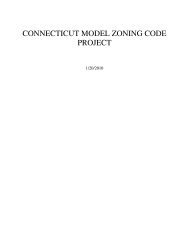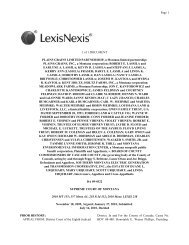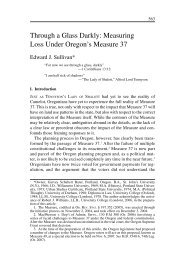LEXSEE DANIEL GUGGENHEIM; SUSAN ... - Land Use Law
LEXSEE DANIEL GUGGENHEIM; SUSAN ... - Land Use Law
LEXSEE DANIEL GUGGENHEIM; SUSAN ... - Land Use Law
You also want an ePaper? Increase the reach of your titles
YUMPU automatically turns print PDFs into web optimized ePapers that Google loves.
2010 U.S. App. LEXIS 25981, *53Page 16language ignores the actual dictionary definition of"speculate." As defined by Webster's New 20th CenturyUnabridged Dictionary (1979), one meaning of"speculate" is precisely "to buy or sell land hoping totake advantage of an expected rise or fall in price."(emphasis added). Having determined that they might beable to free their mobile home park from the Ordinance,the Guggenheims bought the land based on theseinvestment-backed expectations--expectations whichinfluenced the price they were willing to pay for theproperty as well as their expected rate of return on theinvestment.The Guggenheims' beliefs regarding the possibilityof freeing their land from the Ordinance were notself-indulgent delusions, or "starry eyed hope of winningthe jackpot if the law changes," as the majority terms it.Maj. Op. at 20435. Their beliefs were at least plausible inlight of contemporary legal, political, and academicthought. In the modern economic marketplace, thespectre of legal uncertainty haunts every commercialtransaction and influences each party's valuation of theassets involved. For example, the validity of apharmaceutical company's patent will affect thatcompany's [*54] value as a potential acquisition target.Legal uncertainty over rent control has been particularlymarked in California. In 1989 the state amended itsMobilehome Residency <strong>Law</strong> to exempt all newconstruction from local control. Cal. Civ. Code § 798.45.Less than two years before the Guggenheims purchasedtheir property, California had abolished vacancy controlfor rental apartments statewide. Costa-Hawkins RentalHousing Act, § 1, 1995 Cal. Legis. Serv. 331 (A.B. 1164)(West) (codified at Cal. Civ. Code § 1954.50-.53). InJanuary 1999, Santa Monica reformed its strict rentcontrol ordinance, repealing its operation as to any newtenants. Tierra Properties, Santa Monica: A Case Study inGrowth and Rent Control (1999).The Guggenheims and the prior owners of theirmobile home park may have reasonably thought that thestate would abolish rent control--or at least vacancycontrol--for mobile home parks. And the Guggenheimscould reasonably retain those expectations today, asrecent efforts to repeal rent control in California havegarnered significant support. For example, a 2008 ballotproposition to phase out rent control won almost 40% ofthe votes cast. Patrick McGreevy, Prop. 98 Backers[*55] Seek Eminent Domain Limits, L.A. Times, June 5,2008, at 1.Moreover, mobile home rent control ordinances havebeen heavily criticized in academia as an inefficientmethod for providing affordable housing to low andmiddle-income households. See, e.g., Mason & Quigley,16 J. Housing Econ. at 192, 205 (concluding that"housing is no more "affordable" [to subsequent tenants]afterwards than it was before the ordinance was adopted,"and that "virtually all of the economic benefits fromlower regulated rents are paid out annually to finance thehigher sales prices commanded by those dwellings").Given the instances of actual or attempted repeal andreform of rent control ordinances across the country, theparticular scrutiny paid to the issue in California, and thecriticism of mobile home rent control in the academicliterature, the Guggenheims had a reasonableexpectation--or at least, a trier of fact could reasonablyfind they had such an expectation--that they could freetheir land from the Ordinance either through the grant ofa zoning variance, political action targeted towardrepealing the regulation in its entirety, or court action toinvalidate the law. This inference is supported [*56] byevidence presented to the district court that theGuggenheims pursued relief from the Ordinance throughat least two of these avenues in the years following theirpurchase of the mobile home park. The majority readilyadmits that this investment-backed expectation couldhave materially affected the price the Guggenheims werewilling to pay for the mobile home park. "TheGuggenheims might conceivably have paid a slightspeculative premium over the value that the legal streamof rent income would yield, on the theory that rentcontrol might someday end, either because of a change ofmind by the municipality or court action." Maj. Op. at20435. At most, this concession establishes that theGuggenheims did in fact have investment-backedexpectations of freeing the land from the Ordinance; atthe very least, it raises a question of fact for the jury todecide.Finally, the majority, perhaps sensing itsvulnerability on the issue of investment-backedexpectations, attempts to distract the reader byintroducing an entirely irrelevant consideration into theanalysis: the alleged investment-backed expectations ofthe mobile home tenants. Maj. Op. at 20437. Themajority opinion paints a sympathetic [*57] portrait ofsubsequent tenants who purchased mobile homes atmarket rates, in reliance on the continued validity of theOrdinance. But, the Penn Central regulatory taking







